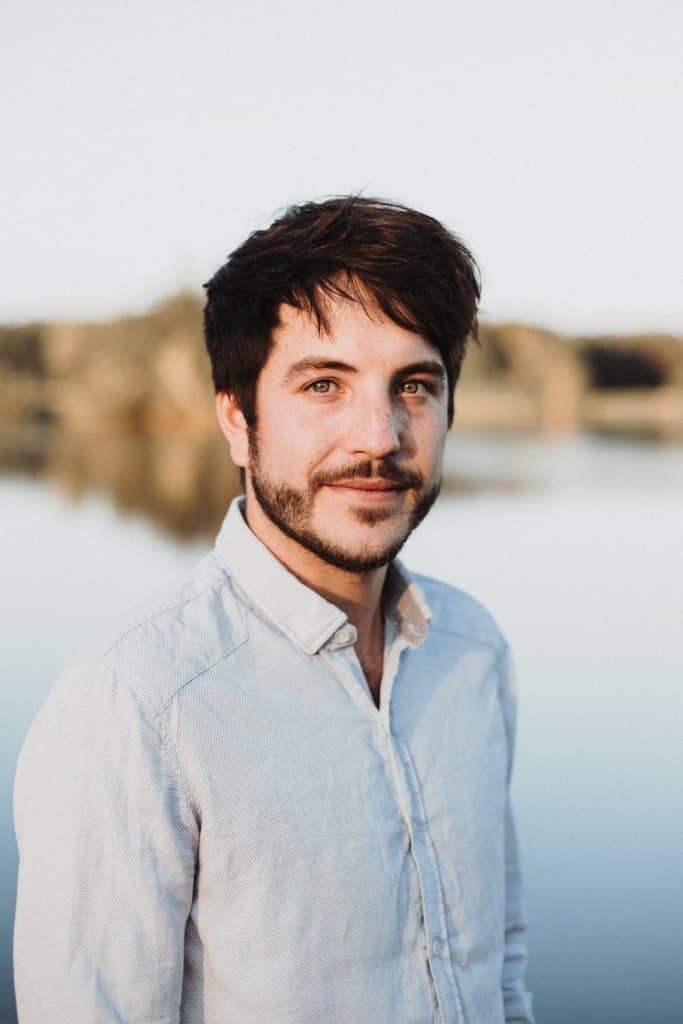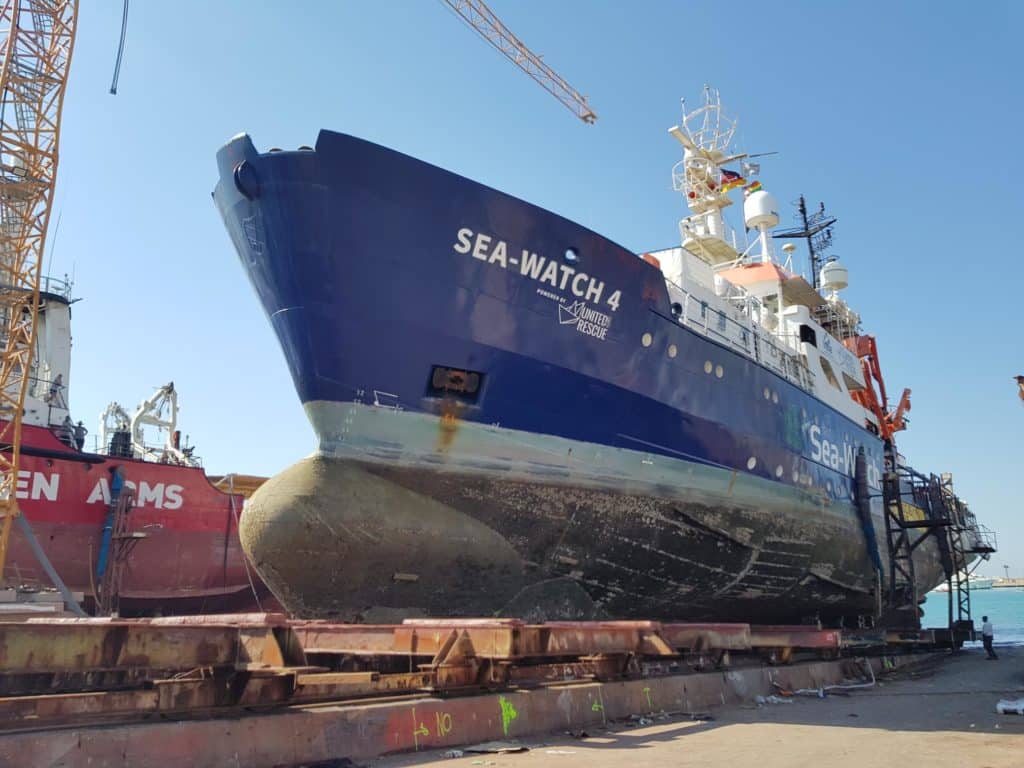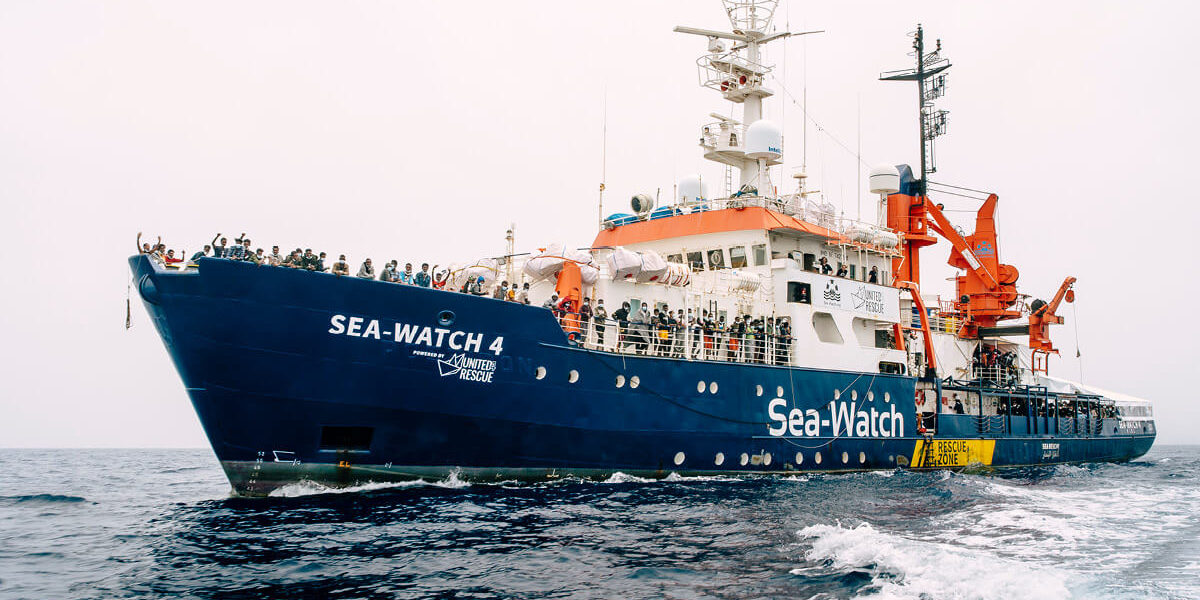The organization SOS Humanity will operate our Sea-Watch 4 in the future. While Sea-Watch is breaking new operational ground, the ship will continue to save people from drowning in the central Mediterranean under the new name Humanity 1. We met Till from SOS Humanity and talked to him about the next chapter of Sea-Watch 4.
Hey Till, who are you and how did you get into civil sea rescue?
I am Till Rummenhohl – Head of Operation at SOS Humanity. I am 30 years old and studied naval architecture and marine technology.
During my studies, I grew the desire to gain more experience in working on large ships. I felt this was important to design large steel ships myself later on. Since my childhood I have been active on the water. I learned and taught sailing, was co-skipper on larger sailing yachts. So, life at sea and nautics were familiar to me from a young age.
In 2015, I started language courses and buddy programmes for refugees in cooperation with my university. In this context, I heard that SOS Mediterranee would send a big civilian rescue ship – the Aquarius – to the central Mediterranean. I saw a unique opportunity to combine my humanitarian passion with the desire to work at sea. In August 2016, I boarded the ship in Trapani and went on a two-month sea rescue mission. Back home, the experience did not let go off me. In 2017, I took part in two more rescue missions in the Mediterranean. In 2018, I became vice-chairman of the German SOS Mediterranee association. Since 2021, I have been employed as Head of Operations at SOS Humanity and am responsible for getting the Humanity 1 into the field.

What is the vision of SOS Humanity? Who is behind it?
As a civilian sea rescue organisation, we work for a world in which the human rights of all are respected. SOS Humanity stands for humanity at sea and on land. We are committed to ensuring that no person has to drown while fleeing and that everyone gets treated with dignity.
Behind this is a team of motivated and committed permanent employees and volunteers. We have a mainly female team in the Berlin office and a 28-member international crew of experienced seafarers, sea rescuers, medics and protection officers.
A respectful working environment is very important to us! We want everyone to feel safe and able to do their job, regardless of their ethnicity, social or economic status, gender identity or sexual orientation.
Our code of conduct applies to all people behind SOS Humanity: both on land and at sea, we do not tolerate any form of discrimination and abuse of power.
Those who have to organise state tasks such as sea rescue in a civilian way need strong allies. That is why the Sea-Watch 4 will become the Humanity 1: a sign of solidarity within the civilian fleet.
What does it mean for you to be part of the civilian fleet?
I think it is very special that so many people from different organisations feel so connected to a cause that they are involved across organisations and support each other. The cooperation within the civilian fleet and with Sea-Watch is solidarity in action and I am proud to be part of this great undertaking. I have great respect for this solidarity and selflessness and feel great gratitude for the support we receive from the entire fleet. Only by working together and strengthening each other can we make a difference.
What do the next months look like for SOS Humanity? What is in the pipeline?
Currently, Sea-Watch 4 is still in dry dock in Burriana for important repairs and a routine inspection. This time is also being used to make a clean handover for our new crew. Sea-Watch’s experienced crews train our team and explain all the tricks of the trade to them. After all, each ship is unique and has its very own inner workings.

The ship will then set off on its journey to Palermo, where it will be christened “Humanity 1” on 19 August. After a week of mission preparation and quarantine on board, our crew will then set off on their first mission to the central Mediterranean. It will be the first of a total of four mission rotations that we plan to undertake this year. Our goal is to come to the aid of people in distress as quickly as possible with Humanity 1 and to continue to work for more humanity in the Mediterranean.
Is there anything else you would like to share with our readers?
Something I never tire of saying: no matter how big the numbers in the statistics seem, no matter how negative the narratives in the media about refugees become, no matter how strong the headwind from politics and parts of society seem: We must never forget that this is about people! People, each of whom has their own individual fate, their own individual past. They put themselves in the greatest danger of their lives in search of protection and safety. Who would we be if we did not come to their aid? Where would our humanity be if we simply left them out there to drown? Because that is what this is all about: Survival at sea, preserving our human values. They are people, not numbers. Let us never forget that.











